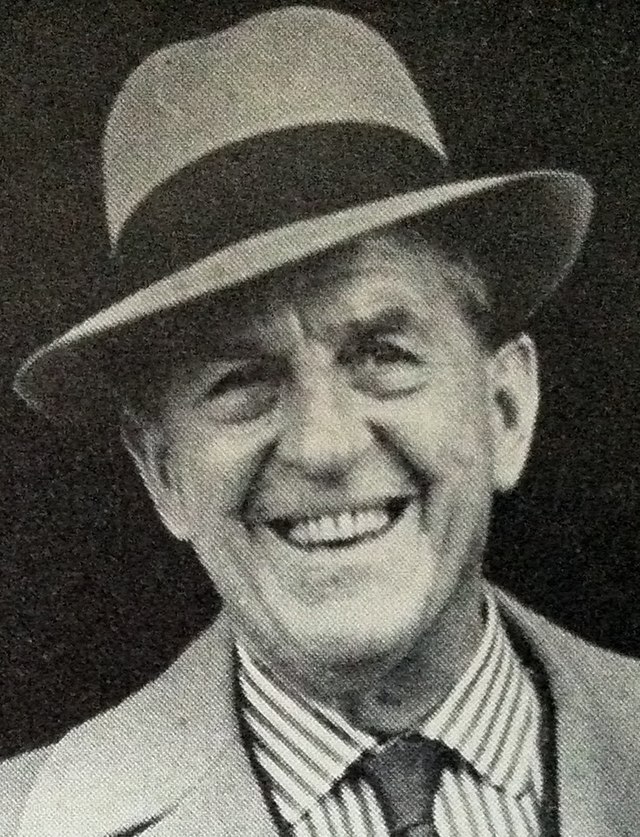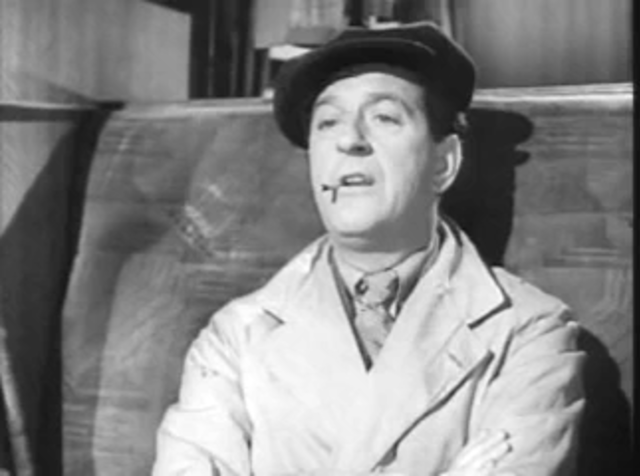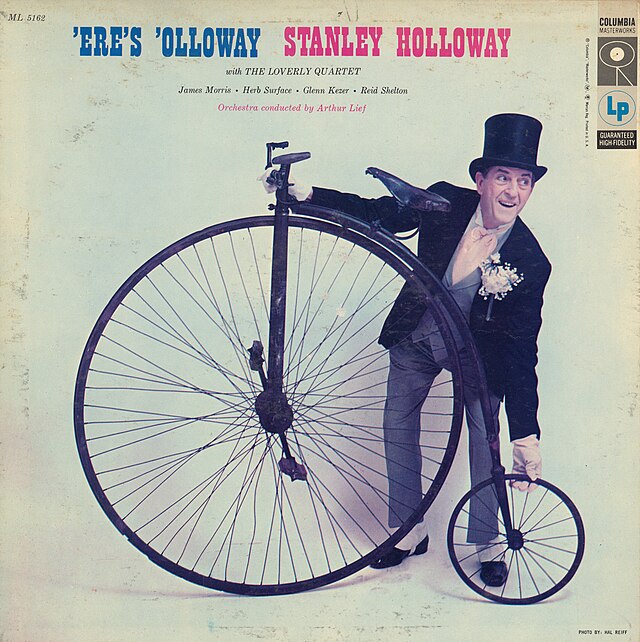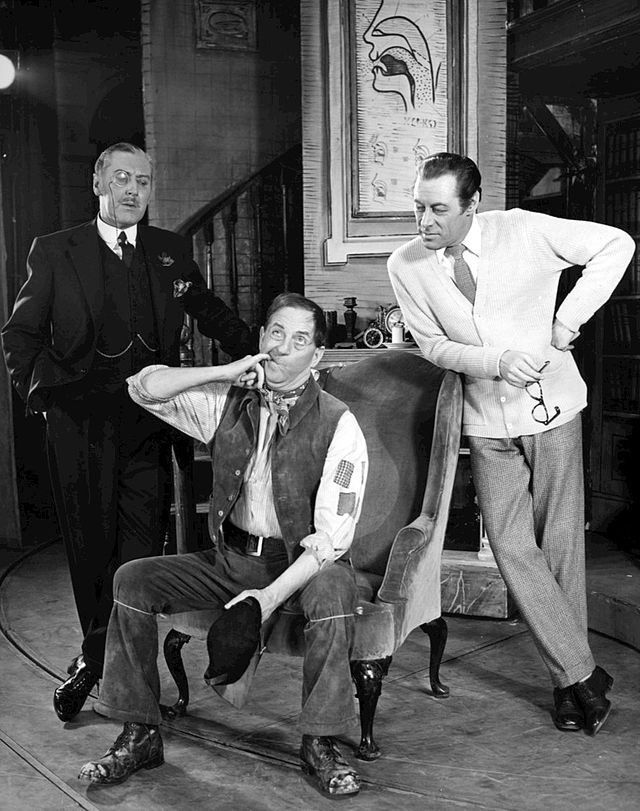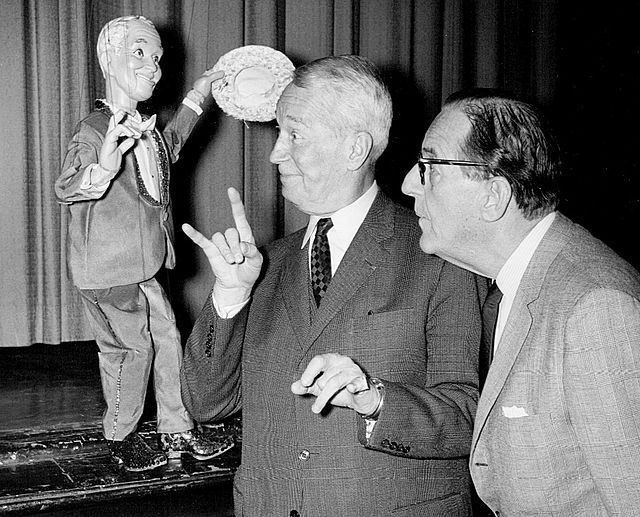Stanley Holloway (1890 – 1982)
Biography and Film Career
Stanley Augustus Holloway was born on October 1, 1890, in Manor Park, then part of Essex and now a suburb of East London. He was the eldest of five children born to George Augustus Holloway, a clerk and amateur poet, and Florence May, a housewife. Though not born into wealth, Holloway grew up in a culturally rich environment where storytelling, music, and humor played a central role in daily life.
Early Life and the Birth of a Performer
From an early age, Holloway showed a keen interest in performance. As a boy soprano in local church choirs, he developed both his vocal talents and a flair for dramatics. Though he left school at the age of 14 to take up clerical jobs, his heart remained in the theatre. He eventually took evening drama classes and was drawn to the world of musical theatre and variety shows.
In 1913, at the age of 23, he joined a concert party known as The Co-Optimists, performing humorous monologues and comic songs that would later become his trademark. His early performances were marked by a mix of charm, wit, and a love of dialects—qualities that helped him stand out on the crowded British music hall circuit.
World War I and Its Influence
With the outbreak of World War I, Holloway enlisted in the Connaught Rangers, an Irish infantry regiment in the British Army. He served in France and Salonika, and it was during these years that he deepened his sense of camaraderie, resilience, and comedic timing. He often entertained his fellow soldiers, developing routines that later formed the basis for his popular wartime and postwar monologues.
Rising Stardom and the Art of the Monologue
After the war, Holloway returned to performing and began to craft a signature act: the comic monologue, often spoken in a Northern English accent and delivered with pitch-perfect timing. His best-known character, Sam Small, a fictional Lancashire man prone to fantastical exaggeration, became immensely popular. Holloway recorded dozens of these monologues, including classics like “Albert and the Lion” and “Brahn Boots.”
During the 1920s and 1930s, he was a fixture on stage, radio, and in early sound recordings. His mixture of northern humor, character-driven storytelling, and musicality made him one of the most beloved comic performers of his era.
Film Career and International Recognition
Stanley Holloway made a successful transition into film in the 1930s, appearing in both comedic and dramatic roles. He became a regular player in the Ealing Studios comedies of the 1940s and early 1950s. His work in films such as “Passport to Pimlico” (1949), “The Lavender Hill Mob” (1951), and “The Titfield Thunderbolt” (1953) captured the whimsical resilience of post-war British society and made Holloway a household name.
However, it was his portrayal of Alfred P. Doolittle—the dustman-philosopher father of Eliza Doolittle—in “My Fair Lady” that would define his international legacy. Holloway played the role in the original 1956 Broadway production, the London revival, and finally in the 1964 film adaptation, for which he earned an Academy Award nomination for Best Supporting Actor. His renditions of “With a Little Bit of Luck” and “Get Me to the Church on Time” remain iconic to this day.
Personal Life and Relationships
Holloway married Alice Foran, a fellow performer, in 1913. The couple had children, but the marriage eventually grew strained, and they divorced in 1937. Two years later, Holloway married Violet Lane, a chorus dancer and stage actress. Their marriage was a long and stable one, lasting until his death. In 1944, they had a son, Julian Holloway, who followed in his father’s footsteps and became a well-known actor and voice artist.
Holloway was known offstage as a warm and generous man, though private and deeply rooted in traditional English values. He enjoyed reading poetry, studying dialects, and writing new monologues. He had a fondness for gardening and was known to recite humorous verses at family gatherings and public events alike.
Later Years and Legacy
As Holloway aged, his film appearances became less frequent, though he continued to work steadily on stage and television. He remained sharp and witty into his eighties, appearing in guest roles on British TV and in occasional films. In 1960, he was appointed an Officer of the Order of the British Empire (OBE) in recognition of his services to entertainment.
Despite his fame, Holloway never lost his grounding. He cherished the traditions of English humor and always saw himself as a performer of the people.
Death and Cause
Stanley Holloway passed away on January 30, 1982, at the age of 91, in Littlehampton, West Sussex. The cause of death was attributed to natural causes, primarily age-related decline. His passing marked the end of an era in British entertainment—he had bridged the gap from Edwardian variety to modern cinema with grace, humor, and enormous talent.
He was laid to rest in St Mary the Virgin Churchyard in East Preston, West Sussex, in a peaceful setting far removed from the footlights of the West End or the sound stages of Hollywood.
________________________________________
Legacy
Stanley Holloway's legacy endures as one of Britain's finest character actors and humorists. His ability to transform everyday characters into iconic figures made him a national treasure. Whether through the heartfelt bravado of Alfred Doolittle or the cheeky tales of Sam Small, Holloway brought joy to millions and left behind a body of work that continues to charm audiences to this day.
Physical Description of Stanley Holloway
• Height: Approximately 5 feet 10 inches (178 cm)
He had a tall and upright bearing, especially noticeable in his stage roles.
• Build: Lean to medium build
Holloway maintained a trim, well-groomed appearance throughout most of his career, with a slightly fuller figure in later life.
• Hair:
o Color: Dark brown in his youth, gradually turned silver-grey
o He often sported a slicked-back hairstyle or short parted hair, especially in his film roles.
• Eyes: Blue-grey
• Face:
o Distinctive, expressive face with arched brows, deep-set eyes, and a wide, animated mouth—ideal for comedic delivery and character work.
o His features could shift easily from warm and affable to sly and cheeky, depending on the role.
• General Presence:
o He had a charming, approachable stage presence, aided by a rich baritone voice and twinkling eyes.
o Always well-dressed in public, typically in classic English tailoring—often a bowler hat, waistcoat, or evening suit, depending on the character.
Stanley Holloway and Dean Martin
The Artful Everyman: Stanley Holloway’s Acting Style
Stanley Holloway possessed one of the most distinctive and enduring acting styles in 20th-century British entertainment. With a career spanning over six decades, he crafted a performance persona that combined warmth, wit, impeccable timing, and a deep understanding of the British character—especially the working-class archetype. His style was rooted in the music hall tradition, but evolved seamlessly to fit the demands of radio, film, and stage drama.
Conversational Naturalism
Holloway's delivery was notable for its natural ease and fluidity. He spoke as if in conversation with the audience, never overplaying a role or forcing humor. Even in comic monologues, his tone suggested he was merely relating something he’d seen or heard. This unpretentious manner made his characters instantly likable, relatable, and grounded in reality.
Whether he was portraying a humble railway worker or the sly Alfred P. Doolittle, his performances never felt constructed—they felt lived in.
Comic Timing and Rhythm
At the core of Holloway’s style was his flawless sense of comic timing. He knew precisely how long to hold a pause, when to lift an eyebrow, and when to let a line land. His delivery in monologues—like “The Lion and Albert”—relied on rhythmic pacing that echoed both verse and music. He used light touches of exaggeration, never going overboard, making his humor feel organic rather than performed.
His physical comedy was understated but sharp. A glance, a tilt of the head, or a sudden shift in tone could communicate entire paragraphs of subtext.
Command of Dialects and Accents
A master of accents, Holloway could effortlessly shift between working-class Cockney, Lancashire, and standard Received Pronunciation. This skill wasn’t just technical—it showed his deep empathy with a broad range of characters across British life. His dialect work wasn’t caricatured; it was authentic, affectionate, and always used in service of character.
This linguistic dexterity gave him great range, allowing him to play everything from loveable rogues and drunken philosophers to upright policemen and jittery clerks.
Musicality and Voice Control
Holloway’s background in singing and musical theatre gave him exceptional vocal control. His baritone voice was rich and expressive, equally suited to bawdy music-hall numbers and tender ballads. In My Fair Lady, his songs were not just musical performances but extensions of character—his “Get Me to the Church on Time” is as much an acting triumph as it is a musical one.
He knew how to use dynamics—shifting from booming joviality to quiet sincerity within the same line—creating emotional contrast and depth.
Character Integrity and Humility
A hallmark of Holloway’s acting was his ability to disappear into a role without overshadowing it. He never demanded the spotlight; he earned it. His characters were often “little men” with big personalities—ordinary figures with unexpected wisdom or comic insight. He imbued each role with dignity, even when playing figures of ridicule or absurdity.
There was no trace of vanity in his work—he was happy to play supporting parts if the story called for it, and often elevated those roles with his skill and charm.
The Gentle Satirist
Though primarily a comic actor, Holloway often used humor to highlight social truths. He could poke fun at British bureaucracy (Passport to Pimlico), war absurdities (The Way Ahead), or class hypocrisy (My Fair Lady)—always with a gentle, affectionate irony. He had a knack for satirizing without sneering, a rare gift that allowed him to appeal across generations and social classes.
________________________________________
Conclusion: A Performer of Rare Balance
Stanley Holloway’s acting style was the product of craft, observation, and deep humanity. He brought the music hall into the mainstream and showed that humor, properly handled, could be both entertaining and revealing. His performances were finely judged, unflashy, and enduringly charming—like a well-told story by an old friend.
He was, in many ways, the quintessential British character actor: able to blend into a crowd or quietly steal a scene with a wink, a word, or a tune.
Memorable Quotes of Stanley Holloway
Stanley Holloway was known not just for his characters but also for his witty, sharply delivered lines—both scripted and spontaneous. Here are some memorable quotes from his films, stage performances, monologues, and interviews:
________________________________________
From Film & Stage Performances
As Alfred P. Doolittle in My Fair Lady (1964):
• "I'm willing to tell you. I'm wanting to tell you. I'm waiting to tell you."
— Classic Holloway rhythm: playful, deliberate, and sly.
• "With a little bit of luck, someone else'll do the blinkin' work!"
— From his iconic song "With a Little Bit of Luck."
• "I'm one of the undeserving poor. That's what I am. Think what that means to a man. It means he's up against middle-class morality for all the time."
— A sharp piece of social satire, delivered with Holloway’s earthy charm.
• "Get me to the church on time!"
— Perhaps his most famous line, sung jubilantly in one of the film’s biggest numbers.
________________________________________
From Comic Monologues (especially the Sam Small & Albert Series)
From “The Lion and Albert” (written by Marriott Edgar, performed by Holloway):
• "There's a famous seaside place called Blackpool, that's noted for fresh air and fun..."
— The legendary opening line of his most iconic monologue.
• "Yon lion's ate Albert!"
— Delivered by Mr. Ramsbottom in deadpan shock. A line made immortal through Holloway’s pitch-perfect delivery.
• "And Mother said, 'Right’s right, young feller—me and you’ll have justice, by gum!'"
— Showing the sharpness and determination of Mrs. Ramsbottom in court.
________________________________________
From Interviews and Anecdotes
• "The secret of timing is to never let them see you waiting for the laugh."
— Holloway’s advice on comic delivery, showing his mastery of stagecraft.
• "I never had to shout to be heard. I always believed in letting the words do the work."
— A statement that reflected his naturalistic, understated approach.
________________________________________
On Music Hall Tradition
• "The music hall taught me everything—timing, truth, and that the audience is your best director."
• "I always felt the man in the cheap seat was the one I had to reach. If he laughed, I’d done my job."
Awards & Recognition of Stanley Holloway
Honorary Titles and Official Recognition
• Officer of the Order of the British Empire (OBE) – 1960
Holloway was appointed OBE in the 1960 Queen’s Birthday Honours List for his services to drama and entertainment. This was a recognition not only of his work on stage and screen but also his contributions to British cultural life, particularly during and after the war years when his performances brought levity and connection to the public.
________________________________________
Academy Awards (Oscars)
• Nomination: Best Supporting Actor – 1964
o Film: My Fair Lady
o Role: Alfred P. Doolittle
Holloway received an Academy Award nomination for Best Supporting Actor for his scene-stealing performance as the cheeky, unpolished dustman in the lavish Hollywood adaptation of My Fair Lady. Though he did not win (the award went to Peter Ustinov for Topkapi), his performance remains one of the most celebrated in musical film history.
________________________________________
Golden Globe Awards
• Nomination: Best Supporting Actor – Motion Picture – 1964
o Film: My Fair Lady
Alongside his Oscar nomination, Holloway was also nominated for a Golden Globe in the same category for the same role, underlining his international acclaim and crossover success in American cinema.
________________________________________
Other Recognitions and Legacy
While Stanley Holloway did not amass a vast collection of competitive awards (as was common for many character actors of his generation), he was widely honored and revered in other important ways:
• West End & Broadway Acclaim:
His performances in My Fair Lady (1956 original Broadway cast and West End revival) received enormous critical praise. Though formal theatre awards like the Olivier and Tony Awards were either not established or still in their early stages, Holloway's work was considered instrumental in the success of the production.
• Public Popularity & Cultural Status:
By the mid-20th century, Holloway was a household name in Britain. His comic monologues (especially the Albert series by Marriott Edgar) were widely distributed on gramophone records and became part of British popular culture. His comic voice recordings sold in huge numbers and were often broadcast on BBC radio.
• Documentary and Retrospective Features:
Holloway was regularly featured in BBC retrospectives and tribute programs in his later years, often reflecting on his legacy in music hall, theatre, and cinema.
• Influence on Future Generations:
He is often credited with bridging the gap between Edwardian music hall tradition and modern screen comedy, paving the way for later comic actors such as Ronnie Barker, John Cleese, and even Rowan Atkinson in terms of timing and character-driven humor.
________________________________________
Posthumous Recognition
• Memorial and Grave:
Stanley Holloway is buried in St Mary the Virgin Churchyard, East Preston, West Sussex, a peaceful resting place for one of Britain’s finest comic voices. His grave is visited by fans and remains a point of cultural memory.
• Continued Use of His Work in British Schools & Broadcasts:
Holloway’s recordings—particularly “Albert and the Lion”—are still used in literature and drama classes across the UK to teach performance, accent, and timing.
Stanley Holloway Movies
1920s
• 1921 – The Rotters
Holloway's film debut in this silent comedy about a family dealing with social climbers.
• 1929 – The Co-Optimists
A filmed version of the popular stage revue showcasing Holloway's musical and comedic talents.
________________________________________
1930s
• 1933 – Sleeping Car
A romantic comedy set aboard a train, where Holloway plays a supporting role.
• 1933 – The Girl from Maxim's
A farcical tale revolving around mistaken identities and romantic entanglements.
• 1934 – Sing As We Go
A musical featuring Gracie Fields as a mill worker; Holloway appears as a policeman.
• 1935 – Squibs
A comedy about a Cockney flower girl; Holloway plays a supporting character.
• 1935 – Play Up the Band
A musical comedy centered on a brass band competition, with Holloway in a comedic role.
• 1937 – Song of the Forge
A drama about a blacksmith's family, highlighting themes of tradition and change.
• 1937 – The Vicar of Bray
A historical comedy where Holloway portrays the titular vicar navigating political upheavals.
• 1937 – Sam Small Leaves Town
A comedy featuring Holloway's character Sam Small embarking on new adventures.
________________________________________
1940s
• 1941 – Major Barbara
An adaptation of George Bernard Shaw's play; Holloway plays a policeman.
• 1944 – This Happy Breed
A drama depicting the life of a British family between the wars; Holloway plays Bob Mitchell.
• 1944 – The Way Ahead
A war film following civilians turned soldiers; Holloway portrays Pvt. Ted Brewer.
• 1944 – Champagne Charlie
A musical biopic about music hall performers; Holloway plays The Great Vance.
• 1945 – The Way to the Stars
A wartime drama focusing on RAF pilots; Holloway plays Mr. Palmer.
• 1945 – Brief Encounter
A romantic drama about an extramarital affair; Holloway plays station attendant Albert Godby.
• 1945 – Caesar and Cleopatra
An adaptation of Shaw's play; Holloway plays Belzanor, a captain of the guard.
• 1946 – Wanted for Murder
A thriller about a serial killer; Holloway plays Sergeant Sullivan.
• 1946 – Carnival
A drama set in the world of ballet; Holloway plays Charlie Raeburn.
• 1947 – Meet Me at Dawn
A romantic comedy involving mistaken identities; Holloway plays Emile.
• 1947 – Nicholas Nickleby
An adaptation of Dickens' novel; Holloway portrays Vincent Crummles, a theatrical manager.
• 1948 – Snowbound
A thriller about a group snowed in at a chalet; Holloway plays Joe Wesson.
• 1948 – One Night with You
A musical comedy featuring Holloway as a tramp aiding a singer.
• 1948 – Hamlet
Laurence Olivier's adaptation of Shakespeare's tragedy; Holloway plays the gravedigger.
• 1948 – The Winslow Boy
A courtroom drama about a father's fight to clear his son's name; Holloway has a supporting role.
• 1948 – Noose
A crime drama set in post-war London; Holloway plays Inspector Kendall.
• 1948 – Another Shore
A comedy about a man dreaming of escaping to a desert island; Holloway plays Alastair McNeil.
• 1949 – Passport to Pimlico
An Ealing comedy where a London district declares independence; Holloway plays Arthur Pemberton.
• 1949 – The Perfect Woman
A sci-fi comedy about a robot woman; Holloway plays Ramshead.
________________________________________
1950s
• 1950 – Midnight Episode
A mystery involving a professor and a stolen manuscript; Holloway plays Professor Prince.
• 1951 – One Wild Oat
A comedy about two fathers trying to prevent their children's marriage; Holloway plays Alfred Gilbey.
• 1951 – The Lavender Hill Mob
An Ealing comedy about a bank clerk's gold heist; Holloway plays Alfred Pendlebury.
• 1951 – Lady Godiva Rides Again
A satire on beauty contests; Holloway plays Mr. Clark.
• 1952 – The Happy Family
A comedy about a family's resistance to government eviction; Holloway plays Henry Lord.
• 1952 – Meet Me Tonight
An anthology film based on Noël Coward's plays; Holloway appears in the segment "Fumed Oak."
• 1953 – Fast and Loose
A comedy involving a stolen necklace; Holloway plays Mr. Crabb.
• 1953 – The Titfield Thunderbolt
An Ealing comedy about villagers saving their railway; Holloway plays Valentine.
• 1953 – The Beggar's Opera
A musical adaptation of John Gay's 18th-century ballad opera. Holloway plays Mr. Lockit, the jailer entangled in the satirical tale of crime and corruption.
• 1953 – A Day to Remember
A comedy-drama about a group of British factory workers on a day trip to France. Holloway portrays Charley Porter, one of the excursionists experiencing cultural mishaps.
• 1953 – Meet Mr. Lucifer
A satirical comedy where a television set seems to bring misfortune to its owners. Holloway plays Sam Hollingsworth, the first recipient of the problematic TV.
• 1954 – Fast and Loose
A light-hearted comedy involving a stolen necklace and a series of misunderstandings. Holloway plays Major George Crabb, adding to the film's humor.
• 1955 – An Alligator Named Daisy
A romantic comedy about a man who inherits an alligator, leading to unexpected adventures. Holloway plays The General, contributing to the film's comedic elements.
• 1956 – Jumping for Joy
A comedy about a man who rescues a greyhound and enters it into races. Holloway portrays Captain Jack Montague, involved in the racing escapades.
• 1959 – Alive and Kicking
A comedy featuring three elderly women who escape from a retirement home and start a new life. Holloway plays MacDonagh, a character they encounter on their journey.
• 1959 – No Trees in the Street
A crime drama set in London's East End, focusing on a young man's descent into crime. Holloway plays Kipper, a local figure in the community.
________________________________________
1960s
• 1961 – No Love for Johnnie
A political drama about a disillusioned Member of Parliament. Holloway portrays Fred Andrews, a character reflecting the protagonist's personal struggles.
• 1961 – On the Fiddle
A wartime comedy about two RAF servicemen involved in various scams. Holloway plays Mr. Cooksley, adding to the film's humorous tone.
• 1962 – Our Man Higgins (TV Series)
A sitcom where Holloway stars as Higgins, an English butler working for an American family, leading to cultural clashes and comedic situations.
• 1964 – My Fair Lady
A musical film adaptation where Holloway reprises his stage role as Alfred P. Doolittle, delivering memorable performances of songs like "With a Little Bit of Luck."
• 1965 – In Harm's Way
A World War II naval drama. Holloway plays Clayton Canfil, contributing to the film's depiction of military life.
• 1965 – Ten Little Indians
A mystery thriller based on Agatha Christie's novel. Holloway portrays Detective William Henry Blore, one of the guests invited to a secluded island.
• 1966 – The Sandwich Man
A comedy following a day in the life of a sandwich board man in London. Holloway plays a park gardener, one of the many characters encountered.
• 1968 – Mrs. Brown, You've Got a Lovely Daughter
A musical comedy featuring the band Herman's Hermits. Holloway plays Mr. Brown, the father of the protagonist, involved in the band's adventures.
________________________________________
1970s
• 1970 – The Private Life of Sherlock Holmes
A film exploring untold stories of the famous detective. Holloway plays a gravedigger, adding to the film's atmospheric setting.
• 1971 – Flight of the Doves
A family adventure about two Irish orphans fleeing to their grandmother in Liverpool. Holloway portrays Judge Liffy, a character they meet along the way.
• 1972 – Up the Front
A comedy set during World War I. Holloway plays The Great Vincento, contributing to the film's humorous take on wartime experiences.
• 1975 – Journey into Fear
A spy thriller involving an American engineer targeted by assassins. Holloway plays Mr. Mathews, a fellow passenger entangled in the intrigue.

